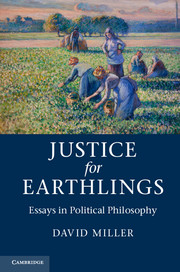Book contents
- Frontmatter
- Contents
- Acknowledgements
- Introduction
- 1 Political philosophy for Earthlings
- 2 Two ways to think about justice
- 3 Social justice in multicultural societies
- 4 Liberalism, equal opportunities and cultural commitments
- 5 Equality of opportunity and the family
- 6 Justice and boundaries
- 7 Social justice versus global justice?
- 8 ‘Are they my poor?’: the problem of altruism in a world of strangers
- 9 Taking up the slack? Responsibility and justice in situations of partial compliance
- 10 A tale of two cities; or, political philosophy as lamentation
- Index
- References
2 - Two ways to think about justice
Published online by Cambridge University Press: 05 February 2013
- Frontmatter
- Contents
- Acknowledgements
- Introduction
- 1 Political philosophy for Earthlings
- 2 Two ways to think about justice
- 3 Social justice in multicultural societies
- 4 Liberalism, equal opportunities and cultural commitments
- 5 Equality of opportunity and the family
- 6 Justice and boundaries
- 7 Social justice versus global justice?
- 8 ‘Are they my poor?’: the problem of altruism in a world of strangers
- 9 Taking up the slack? Responsibility and justice in situations of partial compliance
- 10 A tale of two cities; or, political philosophy as lamentation
- Index
- References
Summary
Justice is one of the oldest topics in political thought, but as anyone working in contemporary political theory will testify, it shows no sign of becoming exhausted. The last quarter of the twentieth century produced a cornucopia of new theories, the landmark work of Rawls being followed by the alternative accounts of social or distributive justice proposed by Barry, Cohen, Dworkin, Nozick, Sen, Steiner, Walzer and many others. Pessimists might want to argue that the Owl of Minerva was going about its business in the usual way, and that philosophizing about justice reached its peak at precisely the moment when the capacity of the modern state to implement any recognizable scheme of social justice was about to disappear. But I shall put that pessimistic thought aside in order to draw attention to a second feature of this literature on justice, namely that there is no sign of an emerging consensus on how justice is to be understood – no sign that, say, a suitably refined version of the Rawlsian theory can yield principles of justice that everyone recognizes as valid. So the situation we are in is one of intense interest in the topic of justice (and I am concerned here primarily with distributive justice in the broadest sense, that is, the just allocation of resources and benefits of all kinds, rights, freedoms, opportunities, property, income and so forth between persons) together with fairly radical disagreement as to which theory of justice is actually correct.
How should we respond to this state of affairs? One answer was provided a short while back by Alasdair MacIntyre, when he argued that modern liberal societies lacked the social forms (he called them ‘practices’) within which ideas of justice could be given a determinate content. As a result, he said, ‘we have all too many disparate and rival moral concepts, in this case rival and disparate concepts of justice, and…the moral resources of the culture allow us no way of settling the issue between them rationally’. I believe that MacIntyre's diagnosis was wrong, but the phenomenon he was drawing attention to is certainly one that deserves our sustained attention. What, after all, is the point of theorizing about justice if the only result of our efforts is to produce yet one more theory to lay alongside the existing array, with no real prospect of converting anyone who already adheres to a rival theory?
- Type
- Chapter
- Information
- Justice for EarthlingsEssays in Political Philosophy, pp. 40 - 69Publisher: Cambridge University PressPrint publication year: 2013
References
- 1
- Cited by



